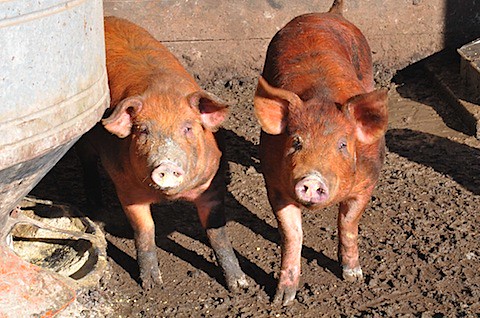Food Tour of Iowa: C and C Farms (of Iowa Farm Families)
If La Quercia’s prosciutto was the food product I most wanted to see, the pork industry is the one that I most wanted to write and educate people about when I started this blog.
In my opinion, factory farmed pigs, pumped full of hormones, antibiotics and steroids, are one of the worst travesties in the modern food landscape, and epitomize the change in the food landscape of foods into “products”. The flavorless, tough and fatty cuts of meat the Hormel’s of the world turn out don’t deserve to be called food, and have unnecessarily soured many people to the delicious and healthy meat that is pork. The same can be said of so many things: of picture perfect tomatoes that are flavorless, of honeydew melons that are a gorgeous green, but taste of nothing. It’s an epidemic.
Thank goodness, Iowa Farm Families are trying to change that perception, at least with pork. They popped up on my radar screen about a week ago, when my delightful neighborhood grocery store started carrying their delicious looking cuts, from chops to ham to bacon. They all looked great, with good marbling and very little fat. Their pork also appealed to me because it was in small packages. For a student, being able to buy a pork chop that weights a quarter of a pound means that I will actually be able to eat it without freezing it: a godsend. However, I know how labeling and packaging can be misleading, and I didn’t want to be fooled. Perhaps anticipating this, IFF thoughtfully provides a pamphlet of who they are, and why their pork is superior, and worth the (very minor, in my opinion) price premium. This of course piqued my curiosity, and made me want to find out more. To find out the difference in person, I visited one of the “farm families” down the road, about 20 miles away (how’s that for local?).
C&C farms is owned by Craig and Corey Daumann. However, they had to be absent, so I was led around by Steve McNeal, director of marketing for IFF. The first difference between commodity pork and IFF pork, Steve explained, is the breed. All IFF pigs are Duroc hogs, which have a good, marbled flesh but overall lower fat content. This makes for healthier food. In addition, IFF hogs are never given antibiotics, hormones or synthetic growth chemicals. Instead, they are allowed to stay with their mothers longer to grow up large enough to weather the harsh Iowa climate. This means that the final product is not artificially enhanced, as it usually is in larger factory farm setups. You can even feel this difference in IFF pork: the flesh is much firmer, less watery and more tender than a comparable Hormel chop.
In addition, they are not “confinement farmed”- contained in a cage that leaves them unable to do more than scarcely turn around, if that. Instead, they are raised in “hoop” barns, in which they can frolic and walk around. This makes for a happier pig, as well as flesh that has had some exercise. From my experience on the farm, I could definitely see friskiness and running around- those pigs were having a good time! Steve assured me that the lack of hormones and synthetic growth additives, presence of the ability to exercise and unique breed combined to create some of the best pork in Iowa.
But does this pay off? I did the work to find out.
Having sampled a variety of their chops, bacons and other cuts, I have to say that IFF makes some of the most delicious pork products in the market. While cooking with their meat, I used fewer spices and marinades, as the tender and delicious flavor of the pork was front and center with their product, in a way that I had rarely tasted before. For their pork chops, I like to just chop them up and stir-fry then with a little soy sauce; they need nothing more. They impart their own unique and delicious flavor to whatever they are cooked with.
What Iowa Farm Families is doing is extremely laudable, and gourmets everywhere should celebrate their efforts. Their commitment to a return to local, real foods that, first and foremost taste good, is something that is lost all too often in today’s world. I tip my hat to them, and look forward to a delicious culinary relationship with their pork.
No comments:
Post a Comment